|
|
|
Sort Order |
|
|
|
Items / Page
|
|
|
|
|
|
|
| Srl | Item |
| 1 |
ID:
132085
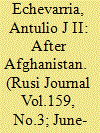

|
|
|
|
|
| Publication |
2014.
|
| Summary/Abstract |
One of the key issues to be discussed at the forthcoming NATO summit will be preparation for future military engagements after more than a decade of counter-insurgency operations in Afghanistan. Antulio J Echevarria II revisits some of the key lessons to be drawn from this experience, and highlights the questions that will need to be addressed if the Alliance is to be equipped to meet future challenges in a changing world.
|
|
|
|
|
|
|
|
|
|
|
|
|
|
|
|
| 2 |
ID:
147314
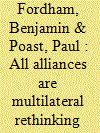

|
|
|
|
|
| Summary/Abstract |
Alliance formation is a multilateral process. The vast majority of alliance relations are created via multilateral alliances. Moreover, leaders assess the alliance as a whole, not just each prospective partner. Any alliance could have three or more members, so one must understand not just why third parties were included in multilateral alliances, but why they were excluded from bilateral alliances. Unfortunately, current research treats alliance formation as a bilateral process: it theorizes about bilateral alliances and tests hypotheses using dyadic research designs. Reconceptualizing all alliances as originating from a multilateral process reveals that a long-neglected theory, William Riker’s size principle, illuminates the role of power in alliance formation. Using k-adic data to analyze multilateral processes, we find strong support for Riker’s claim about minimum winning coalitions in world politics. Our argument and findings, by highlighting how a fundamental state behavior like alliance formation follows a multilateral process, suggest rethinking much of international relations research.
|
|
|
|
|
|
|
|
|
|
|
|
|
|
|
|
| 3 |
ID:
149474


|
|
|
|
|
| Summary/Abstract |
The scientific study of war has largely ignored necessary conditions for war onset. Conflict scholars have previously identified alliances as a mechanism that brings about the initial expansion of war but have not examined whether it is a prerequisite for large wars. We argue that wars diffuse into multiparty wars only in the presence of alliances. In other words, in the absence of any alliance ties, war would not include more than two parties. We put forth a theoretical rationale for this relationship and conduct a series of tests on both dyadic and multiparty wars between 1816 and 2007. These tests provide support for our hypothesis, suggesting that alliances are a virtual necessary condition for multiparty wars: the larger the war, the more likely alliances are a necessary condition.
|
|
|
|
|
|
|
|
|
|
|
|
|
|
|
|
| 4 |
ID:
137226
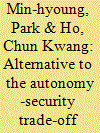

|
|
|
|
|
| Summary/Abstract |
Most of the alliances that were formed during the Cold War period were known as a so-called “asymmetric alliance,” which means strong states provide one-sided support for the partner in a relationship at the expense of the weaker power’s autonomy. In an asymmetric alliance, a weak state gets full security support from the superpower, but in return, the weak state loses its autonomy. In this case, there is a trade-off between security and autonomy of the weaker state. This is what the Autonomy-Security Trade-off Model suggests. However, after the end of the Cold War, the weak powers, especially the developing country, have tried to increase its autonomy without any loss of its security—unlike what the Autonomy-Security Trade-Off Model argues. In this case, there may not be necessarily a trade-off between autonomy and security if a weak state decides to increase both autonomy and security simultaneously. The weak state does not usually want to lose its security, therefore it tries to find a strategy that can increase its autonomy without decreasing its security. In this sense, this paper argues that the Autonomy-Security Trade-off model has limitations to explain the above kind of national action after the Cold War. In line with this, the goal of this paper is to offer an alternative model to explain an asymmetric alliance relationship by looking at the case of the
ROK-U.S. alliance at the turn of the twenty-first century.
|
|
|
|
|
|
|
|
|
|
|
|
|
|
|
|
| 5 |
ID:
132561
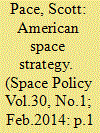

|
|
|
|
|
| Publication |
2014.
|
| Summary/Abstract |
This Viewpoint addresses American space strategy and the choices that lie before US space practitioners. Space activities today play critical roles in U.S. national security, economic growth, and scientific achievements. Satellite communications link the world. The Global Positioning System (GPS) is an integral part of several critical infrastructures, and enables functions ranging from survey and construction, to farming, finance, and air traffic management e not to mention US military forces worldwide. Less well understood is how the GPS time signal provides a global time base for encrypted communications e including point-of-sale transactions with credit or debit cards. Without GPS, much of today's economy would come to a halt. Beyond the Earth, we have rovers on the surface of Mars, and a probe that has left the solar system. The International Space Station represents a unique collaborative
partnership between the United States, Europe, Canada, Japan, and Russia. Spacefaring states are concerned with the long-term sustainability and security of space activities as a result of increasing orbital debris and the proliferation of space capabilities of new national entrants, some of them potential adversaries.
|
|
|
|
|
|
|
|
|
|
|
|
|
|
|
|
| 6 |
ID:
130242
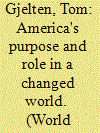

|
|
|
|
|
| Publication |
2014.
|
| Summary/Abstract |
The presidencies of George W. Bush and Barack Obama suggest what doesn't work in efforts to promote US influence in the world. By ordering an ill-conceived invasion of Iraq, Bush alienated US allies. His policies of secretly imprisoning Islamist militants and then subjecting them to "enhanced" interrogation and indefinite detention at Guantánamo struck Muslims everywhere as evidence of a war on Islam. Barack Obama, elected as the most explicitly anti-war president since Woodrow Wilson, came into office determined to undo the international damage done by his predecessor. "The walls between old allies on either side of the Atlantic cannot stand," Obama said in Berlin in 2008, and a year later, speaking in Cairo, he promised "a new beginning" with the Muslim world, with relations "based upon mutual interest and mutual respect." As promised, he withdrew US combat troops from Iraq. By 2013, however, Obama had fared little better than Bush in his global outreach. According to the Pew Research Center, support for the United States in Egypt, Jordan, Lebanon, and Pakistan was actually lower than it had been in the last year of the Bush administration. In Europe, the US favorability rating was higher than it was under Bush, but it had fallen steadily in the years since Obama took office, and it remained far below where it stood in 2000. One possible lesson from these years is that presidential personalities, speeches on foreign stages, and the changing international opinions of US policies matter less than we might think. Perhaps the most reliable measure of America's standing in the world is how appealing the country is to all those who are considering migration. Since 2007, Gallup surveys in more than one hundred and fifty countries have shown that the United States is far and away the number one favored destination. The most recent survey projected that one hundred and thirty-eight million people worldwide would like to move permanently to the United States, more than three times the number who would choose the United Kingdom, the second most favored destination. Those numbers show the United States still represents opportunity and promise to people around the world, and it is clearly in the US global interest to maintain that reputation.
|
|
|
|
|
|
|
|
|
|
|
|
|
|
|
|
| 7 |
ID:
130897
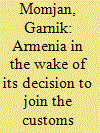

|
|
|
|
|
| Publication |
2014.
|
| Summary/Abstract |
I will speak about the situation in Armenia. On September 3, 2013 at the meeting with President Putin in Moscow, our President Serzh Sargsyan announced that Armenia would join the custom union. This statement echoed all over the world : in the evening, all leading information agencies and the media - BBC, Euronews and the Wall Street Journal were discussing it; they concluded that Russia had put pressure on Armenia.
|
|
|
|
|
|
|
|
|
|
|
|
|
|
|
|
| 8 |
ID:
128739


|
|
|
|
|
| Publication |
2014.
|
| Summary/Abstract |
In this article I view Asian alliances as a product of universal security needs and culturally constructed variables. While the alliance remains one of the fundamentals of contemporary international politics, I attempt to show through comparative analysis of the Sino-Soviet alliance and the Japan-US security alliance how subtle differences of national developmental experience can significantly affect political outcomes in East Asia.
|
|
|
|
|
|
|
|
|
|
|
|
|
|
|
|
| 9 |
ID:
147315
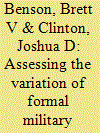

|
|
|
|
|
| Summary/Abstract |
Many critical questions involving the causes and consequences of formal military alliances are related to differences between various alliances in terms of the scope of the formal obligations, the depth of the commitment between signatories, and the potential military capacity of the alliance. Studying the causes and consequences of such variation is difficult because while we possess many indicators of various features of an alliance agreement that are thought to be related to the broader theoretical concepts of interest, it is unclear how to use the multitude of observable measures to characterize these broader underlying concepts. We show how a Bayesian measurement model can be used to provide parsimonious estimates of the scope, depth, and potential military capacity of formal military alliances signed between 1816 and 2000. We use the resulting estimates to explore some core intuitions that were previously difficult to verify regarding the formation of the formal alliance agreement, and we check the validity of the measures against known cases in alliances as well as by exploring common expectations regarding historical alliances.
|
|
|
|
|
|
|
|
|
|
|
|
|
|
|
|
| 10 |
ID:
128999
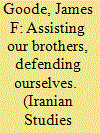

|
|
|
|
|
| Publication |
2014.
|
| Summary/Abstract |
The Iranian military intervention in Oman (1972-75) proved to be one of Shah Mohammad Reza Pahlavi's most successful foreign policy initiatives. He entered at the request of Sultan Qabus to help quell the Marxist rebellion of the Popular Front for the Liberation of Oman in Dhufar province. The shah took this action without any prior consultation with either Britain or the United States, acting for reasons wholly related to Iran's regional security. In so doing, he angered most of his Arab neighbors, who protested vigorously. He persisted. His troops tipped the balance in favor of the sultan's forces, contributing to a speedy end to the insurrection, for which Iran earned the lasting gratitude of the sultan.
|
|
|
|
|
|
|
|
|
|
|
|
|
|
|
|
| 11 |
ID:
130170


|
|
|
|
|
| Publication |
2014.
|
| Summary/Abstract |
Asia's middle powers face a trilateral dilemma stemming from their relationships with the U.S. and China. This paper uses the Australian example to examine the dilemma. It shows that Australia has bound itself to the U.S. because of domestic political factors, cost considerations, a belief that it can keep its interests separate, and its perception of regional threats. The paper then argues that others are likely to resolve their trilateral dilemmas in ways that make the regional strategic dynamic more competitive.
|
|
|
|
|
|
|
|
|
|
|
|
|
|
|
|
| 12 |
ID:
130176
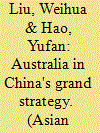

|
|
|
|
|
| Publication |
2014.
|
| Summary/Abstract |
This paper examines China's strategic interests in Australia. From the security per- spective, Beijing hopes that Australia will be a constructive factor for its peaceful rise. On the economic side, Beijing hopes that the bilateral relationship will ensure sufficient and sustainable resources and energy supplies from Australia for China's domestic needs
|
|
|
|
|
|
|
|
|
|
|
|
|
|
|
|
| 13 |
ID:
130964
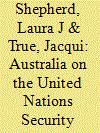

|
|
|
|
|
| Publication |
2014.
|
| Summary/Abstract |
Until 2015, Australia is uniquely positioned on the world stage to make a real difference to women's lives in conflict, transitional and post-conflict countries by ensuring they are actively represented in all peace negotiations1. The Australian government has secured not only a non-permanent seat on the United Nations Security Council (UNSC), but also a seat on the Executive Board of UN Women, the UN entity charged with enhancing gender equality and the empowerment of women. These represent two internationally significant avenues through which the Australian government can fulfil its promise to engage women in the governance of international peace and security, furthering the UN's Women, Peace and Security (WPS) agenda. This agenda, the primary architecture of which comprises seven interrelated UNSC Resolutions dating back to UNSC Resolution 1325 (2000), mandates that women should be represented at and actively participate in all peace negotiations, as well as making binding international commitments to eliminate violence against women and protect women's rights
|
|
|
|
|
|
|
|
|
|
|
|
|
|
|
|
| 14 |
ID:
132864
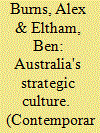

|
|
|
|
|
| Publication |
2014.
|
| Summary/Abstract |
This article draws on fourth generation strategic culture debates to show the gap between the rhetoric of Australian defence and the more modest reality. Our analysis shows that these limits derive from tensions between national strategic culture and organizational strategic subcultures. There are serious debates in the nation regarding the preferred course of the Australian military and security policy. This article frames these debates by examining the 'keepers' of Australia's national strategic culture, the existence of several competing strategic subcultures, and the importance of norm entrepreneurs in changing defence and national security thinking. Strategic subcultures foster compartmentalization, constraints, and bureaucratic silos that narrow national conceptions of security threats and opportunities, and impinge on the formation of coherent foreign and defence policy in relation to the Asia-Pacific region. This analysis shows that a distinct national strategic culture and organizational strategic subcultures endure beyond individual governments, placing potential limits on Australia's interface with other Asia-Pacific strategic cultures in the future.
|
|
|
|
|
|
|
|
|
|
|
|
|
|
|
|
| 15 |
ID:
132081


|
|
|
|
|
| Publication |
2014.
|
| Summary/Abstract |
The NATO summit in Wales will be one of the most important since the Cold War ended - the first such summit after what is, undeniably, the end of the post-Cold War era. The goals of transitioning Afghanistan operations, preparing NATO for future challenges, and cementing the transatlantic bond have all been lent urgency by the crisis in Ukraine and the collapse of positive relations with Russia. James Bergeron explores where NATO has been on its twenty-five-year journey through the post-Cold War era and surveys the strategic challenges that the Alliance now confronts.
|
|
|
|
|
|
|
|
|
|
|
|
|
|
|
|
| 16 |
ID:
130702
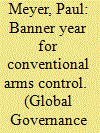

|
|
|
|
|
| Publication |
2014.
|
| Summary/Abstract |
THE CONTROL OF CONVENTIONAL ARMS HAS OFTEN SEEMED THE POOR COUSIN of the global efforts to control weapons of mass destruction (WMD). Since the advent of the atomic era, the focus of arms control and disarmament activity has been overwhelmingly on nuclear weapons and their lesser, if still ugly, stepsisters of biological and chemical weapons. The initial multilateral arms control agreements concerned themselves with limits on the testing of nuclear weapons and, shortly thereafter, with their nonproliferation (e.g., the Nuclear Nonproliferation Treaty of 1968). Bilateral US-Soviet/Russian arms control arrangements also predominantly dealt with the reduction of strategic nuclear forces and restraints on deployments of defenses against (nuclear tipped) ballistic missiles. Efforts to reduce major conventional weapon systems were also taken up in the 1980s in the context of negotiations
between the opposing alliances of NATO and the Warsaw Pact, eventually culminating in the Treaty on Conventional Forces in Europe (CFE Treaty) of 1989. This treaty provided for a massive reduction in the conventional forces that had confronted each other for years in Central Europe and established a new, far more stable security order on the continent. Even the CFE Treaty, however, tended to be overshadowed by other major disarmament agreements concluded in those heady post-Cold War days: the Intermediate Nuclear Forces Treaty (1987), Chemical Weapons Convention (1993), Comprehensive (Nuclear) Test Ban Treaty (1996), and various US-Russian bilateral strategic nuclear arms accords of the 1990s and early 2000s (e.g., the Strategic Arms Reduction Treaty and the Strategic Offensive Reductions Treaty).
|
|
|
|
|
|
|
|
|
|
|
|
|
|
|
|
| 17 |
ID:
134088


|
|
|
|
|
| Publication |
2014.
|
| Summary/Abstract |
One reason why Europe went to war in 1914 is that all of the continental great powers judged it a favorable moment for them to fight, and all were more pessimistic about postponing the fight until later. Not only is this historical paradox an interesting puzzle in its own right, but it sheds light on what is arguably the reigning theory of the causes of wars in general: James Fearon's rational bargaining theory. None of Fearon's three main mechanisms-private information, commitment problems, or indivisibility of stakes-can explain the paradox of the universal, simultaneous view of 1914 as a favorable year for war. Two mechanisms that play a marginal role in his analysis, however-bounded rationality in multidimensional power assessments and attempts to mitigate power shifts through coercive diplomacy-help to explain how Europe's powers became trapped in a choice between war now and war later. These mechanisms were set in motion by background strategic assumptions rooted in the culture of militarism and nationalism that perversely structured the options facing Europe's political leaders in 1914. Whereas Fearon's theory assumes that states are paying equal attention to all relevant information, in 1914 each power's strategic calculations produced disproportionate levels of self-absorption in its own domestic concerns and alliance anxieties.
|
|
|
|
|
|
|
|
|
|
|
|
|
|
|
|
| 18 |
ID:
133366


|
|
|
|
|
| Publication |
2014.
|
| Summary/Abstract |
Two years ago, at our NATO Summit in Chicago. NATO leaders endorsed the review of NATO's deterrence and defence posture (D&DP).
|
|
|
|
|
|
|
|
|
|
|
|
|
|
|
|
| 19 |
ID:
129104
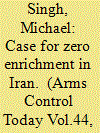

|
|
|
|
|
| Publication |
2014.
|
| Summary/Abstract |
In the debate over sanctions on Iran-their role in bringing Tehran to the negotiating table and their proper place in U.S. diplomatic strategy in the future-scant attention has been paid to a major shift in the negotiating position of the P5+1, the group of six countries (China, France, Germany, Russia, the United Kingdom, and the United States) that is negotiating with Tehran over the Iranian nuclear program. No longer is the P5+1 demanding that Iran halt uranium enrichment. Indeed, in the November 24 first-step nuclear accord, the Joint Plan of Action,[1] the P5+1 all but concedes that Iran will be permitted to enrich in perpetuity. In separate comments that have quickly become conventional wisdom among Iran analysts, U.S. negotiators now characterize their previous position that Iran should halt enrichment as "maximalist."[2] Although undoubtedly expedient, this shift away from a zero-enrichment negotiating position is misguided and unnecessary.[3] The U.S. shift away from zero enrichment to limited enrichment represents a significant diplomatic victory for Iran. For the last decade, the position of the EU-3 (France, Germany, and the UK) and then the P5+1 had been that Iran must "suspend all enrichment-related and reprocessing activities, including research and development." This position was enshrined as an Iranian obligation in a series of UN Security Council resolutions.[4] Iran, however, asserted a "right to enrich" and refused to halt enrichment after resuming it when nuclear talks with the European Union broke down in 2005. This difference formed the core of the confrontation that subsequently developed between Iran and the allies.
|
|
|
|
|
|
|
|
|
|
|
|
|
|
|
|
| 20 |
ID:
132996
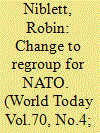

|
|
|
|
|
| Publication |
2014.
|
| Summary/Abstract |
In a world of flashpoints and European defence cuts the alliance needs strengthening, when the British government offered to host the NATO summit in Wales on September,4-5, few foresav that this would be a defining moment in the history of the Atlantic Alliance.
|
|
|
|
|
|
|
|
|
|
|
|
|
|
|
|
|
|
|
|
|